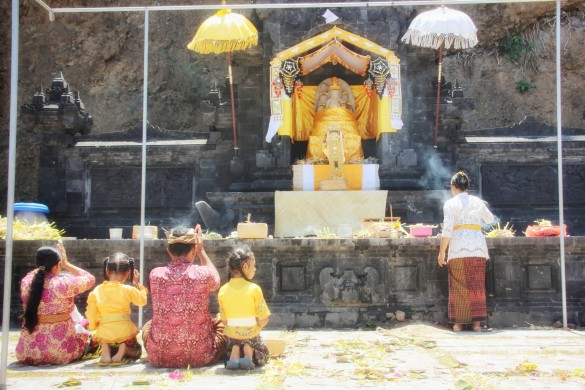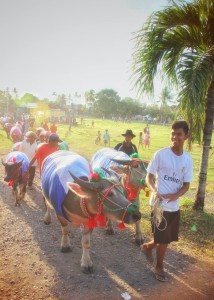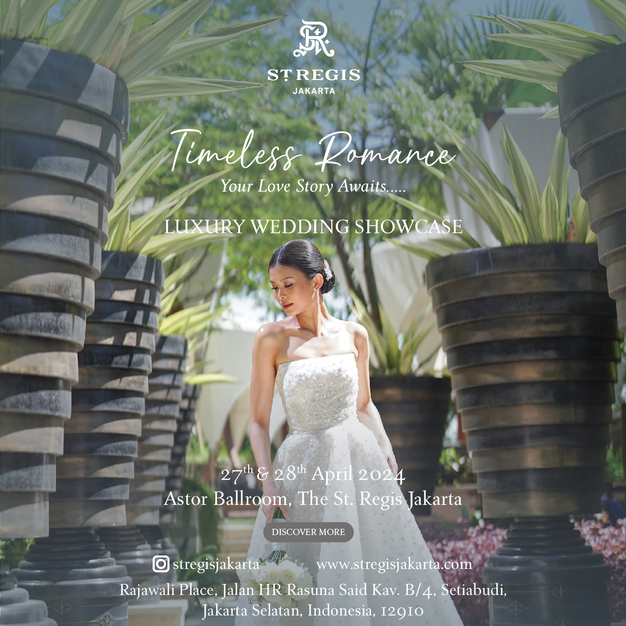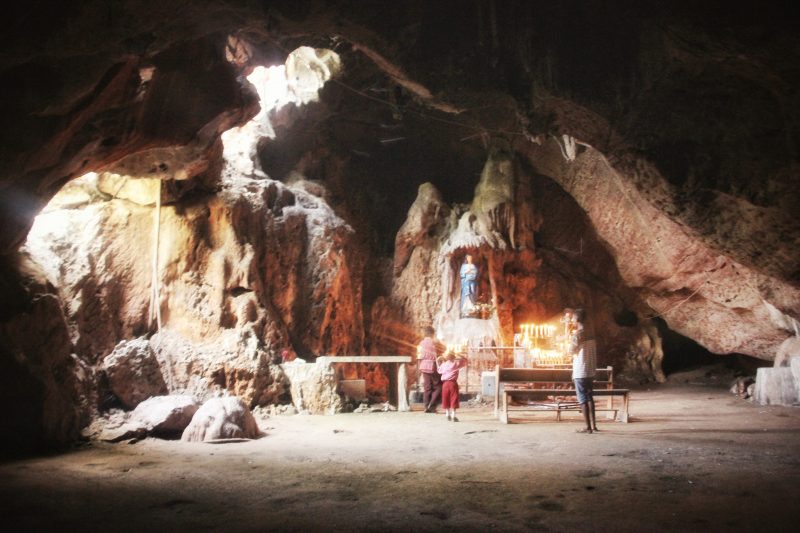Travelling throughout Indonesia, religious affiliation is a question I’m frequently asked. My forename gives away my Christian background. Lately, I view Christianity less as a definition of my personal faith, and more as my “mother tongue” of spiritual languages, which I use to express my spirituality and relate to fellow “native speakers.”
Recently, I concluded a Nusa Tenggara pilgrimage for my travel writing project Di Antara Nusa-Nusa/Faraway Isles. Though I’ve always been aware of the diverse spiritualities represented between Bali and Timor, encountering them firsthand becomes an invaluable experience of understanding the significance of human spirituality to the Indonesian identity.
Bali
My visit to Karangasem coincided with Galungan – a holiday celebrating the triumph of dharma (good) over adharma (evil). Set by a lotus pond outlooking the Indian Ocean, the ornately sculpted stone temple breezed with the fragrant incense of offerings. Dressed in vibrant-coloured festive sarongs and sashes, families came to pray together and bless each other with holy water.
I felt slightly guilty for being a gazing tourist in a sacred space, but found solace in “praying with my camera” – commemorating expressions of the primal human urge to communally worship some form of Higher Power, cherishing the beautiful cultures born of these shared faiths, and recognizing spiritual experiences which parallel my own in different spiritual languages.


That evening, I made new friends, swimming over the sunset on the shores of Candidasa. Agus, Kadek, Hendra and Yogi normally study or work elsewhere in Bali, but were home to visit their parents in Karangasem for Galungan. They invited me to dinner – barbecue chicken under the stars by the sea, with rice and sambal on a shared banana leaf – and offered me a ride to the seaport when I left a couple days later. Many weeks later they still said hello, telling me stories of more reunions revolving around Hindu rituals and offering me prayers for my safety.
Nusa Tenggara Barat
Predominantly Muslim neighbours Lombok and Sumbawa have contrasting cultural perspectives on Islam. While the Sasak of Lombok received Islam through trade and royal wars related to Java and Bali, the Samawa and Bima of Sumbawa converted through the colonial powers of South Sulawesi’s Gowa-Tallo maritime empire.
I spent Idul Adha in Sembalun, East Lombok. Often compared to Easter and Passover, Idul Adha commemorates Abraham’s obedience to God’s command to sacrifice his long-awaited only son, and the son’s eleventh-hour salvation by a God-sent ram to take his place. Though my host wasn’t comfortable letting me join shalat Ied, I was allowed to take distant photographs of the veiled women bowing before a scenic backdrop of Rinjani’s sun-kissed hills in the morning light. The imam led prayers for the Hajj pilgrims in Mecca.
Lombok’s Islam incorporates Wetu Telu, an ancient Sasak philosophy of social order. Often misunderstood as a heretical form of Islam that performs three daily prayers instead of five, Wetu Telu is in fact a triadic worldview revolving around the Divine, the natural world, and human communities. Environmental activists in Lombok seek to collaborate with local Muslim leaders to revive Wetu Telu’s awig-awig: a customary law concerning environmental conservation through a sustainable system of community leadership.
Boasting no memories of pre-Islamic local wisdom, Sumbawa claims to have been “thoroughly Islamised.” “The Samawa identity is Islam,” said Sukri, the Customary Secretary of the Sumbawa Sultanate. Simultaneously, he accounts the harmonious co-existence of 19 ethnicities in Sumbawa Besar, and the Sultan’s gift of land and assets to local Christian churches.

This October, as Festival Moyo paraded human beings to entertain government officials in Sumbawa Besar with cultural performances, cultural activist Syamsu Ardiansyah initiated an alternative grassroots festival that celebrates the Gulf of Saleh’s buffalo-driven agricultural heritage.
“Throughout Nusantara, buffaloes are believed to be a vehicle that brings humans closer to the Divine,” Ardiansyah explains his Kebo Balamung minifest in Empang, central Sumbawa. “Even after Samawa converted to Islam, we continue to believe that owning four buffaloes is the key to afford building a house, university tuition, and a pilgrimage to Mecca. In Sumbawa, when we find someone irritatingly foolish, we call him or her kebo balamung – a buffalo in clothes. But this minifest literally dresses the humble buffalo, to celebrate the prosperity and spiritual enlightenment this animal has enabled humans to attain.”
Ardiansyah is currently on a multi-faith spiritual pilgrimage between Bali and Toraja. Along with Literasi Sumbawa Institute, Ardiansyah is preparing a museum of Indonesia’s diverse faiths in the Gulf of Saleh’s Gili Dewa. There, he plans to fly flags of the 16 nations reached by the ashes of Tambora’s 1815 supervolcanic eruption.
Nusa Tenggara Timur
NTT’s traditional belief systems are generally based on worshipping the Divine (usually represented by a Heavenly Father above all Creation), caring for the natural world (usually personified in a life-giving Mother Earth), and honouring the intergenerational legacy of life (usually expressed in culture and ancestral worship). Today, NTT Christians continue to worship the God of their ancestors as Jesus Christ, express devotions to Mother Earth as Mary if they’re Catholic, and practice traditional stewardship of the natural world.
My mother’s Rotinese family gives credit to the Dutch Protestant missions for education and progress. “In the 18th century, Roté has become home to Nusantara’s first charter school,” said Rotinese historian Matheos Messakh, describing independently run local folk schools funded by the Dutch missions. “In the 1930s, many Rotinese rose to prominent positions in the Dutch East Indies. They were not necessarily aristocrats, because Roté got educated ahead of other Indonesians. Unfortunately, education in Roté lost funding and manpower when Indonesia gained independence. Consequently, most Rotinese today equate success to exodus, because they think their little home island has nothing to offer big achievers.”
I’d planned to finish this trip celebrating Christmas in my grandmother’s hometown in Roté. But since I first visited relatives in Timor in 2013, I’d begun questioning the premise that the only reason my grandparents left was to start a better new life in Java. Recently, new friends throughout Flores and Timor – who share my grandparents’ cultural roots – have been suggesting that my search for other answers might be opening a Pandora box my elders would rather keep shut.
So I finished on a late November morning over Portuguese rosary devotions at a coastal chapel adorned with fiery flamboyant blossoms in Larantuka. I’m missing the Catholic town’s Pre-Christmas Advent rituals, but by then I’d be with my extended family in Java, hoping to gain their blessing to reschedule a proper homecoming to Roté in 2017. “Come visit us next year for Semana Santa,” said my friends in Larantuka, inviting me to their annual Easter parade.
Typing this under the Christmas tree in my parents’ home in Jakarta, with the television broadcasting live news of religious hostility, I take a deep breath and remember moments where my eyes have recently met those of fellow Indonesians through caring prayers, kind deeds, and sheer reverence for the Universe’s life energies.
At a time when it’s easier to judge and dehumanise other people’s political religious interests, I give thanks for the rare privilege of walking my recent Indonesian pilgrimage between faraway isles. In the meantime, I echo after the angels in Bethlehem, “Peace on earth, and goodwill to humankind.”




